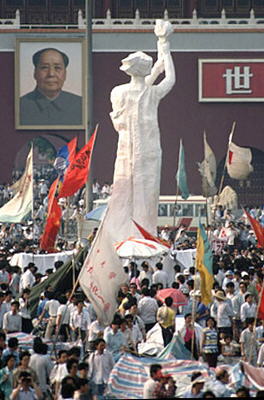
[With the permission of Monthly Review Press, Links International Journal of Socialist Renewal is publishing an exclusive excerpt from Steve Early’s new book, Embedded With Organized Labor: Journalistic Reflections on the Class War at Home. Embedded With Organized Labor describes how trade union members in the United States have organised successfully, on the job and in the community, in the face of employer opposition now and in the past. Steve Early has produced a provocative series of essays -- an unusual exercise in “participatory labor journalism” useful to any reader concerned about social and economic justice. As workers struggle to survive and the labour movements try to revive during the current economic crisis, this book provides ideas and inspiration for trade union activists and friends of labour alike.

By Rick Wolff
June 5, 2009 -- The greatest tragedies among many in the collapse and bankruptcy of General Motors (GM) concern what is not happening. There are those solutions to GM's problems not being considered by Obama's administration. There are the solutions not being demanded by the United Auto Workers Union (UAW). There are all the solutions not even being discussed by most left commentators on the disaster. Finally there are crucial aspects of GM's demise not getting the attention they deserve.

By Federico Fuentes
June 1, 2009 -- Addressing the 400-strong May 21 workshop with workers from the industrial heartland of Guayana, dedicated to the “socialist transformation of basic industry”, Venezuelan President Hugo Chavez noted with satisfaction the outcomes of discussions: “I can see, sense and feel the roar of the working class.”
“When the working class roars, the capitalists tremble”, he said.
Chavez announced plans to implement a series of radical measures, largely drawn from proposals coming from the workers’ discussion that day. The workers greeted each of Chavez’s announcements with roars of approval, chanting “This is how you govern!”
Chavez said: “The proposals made have emerged from the depths of the working class. I did not come here to tell you what to do! It is you who are proposing this.”
Nationalisation and workers’ control
Marta Harnecker: Ideas for the struggle #5 -- Minorities can be right

[This is the fifth in a series of regular articles. Click HERE for other articles in the series. Please return to Links regularly read the next articles in the series.]
By Marta Harnecker, translated by Federico Fuentes for Links International Journal of Socialist Renewal
1. Democratic centralism implies not only the subordination of the minority to the majority, but also the respect of the majority towards the minority.
El Salvador: New FMLN president declares: `Change begins now!'
Committee in Solidarity with the People of El Salvador, June 3, 2009 -- On June 1, Mauricio Funes and Salvador Sanchez Cerén were sworn in as president and vice-president of El Salvador at the Feria Internacional Convention Center in San Salvador. It was a magical day for the Salvadoran people, social movement organisations, and the leftist Farabundo Marti National Liberation Front (FMLN), which Funes and Sanchez Cerén represent.
Philippines: `Let us now begin the Revolution for Change'

Opening talk by Sonny Melencio to the “Pagbabago! No More Trapos in 2010!” forum
June 1, 2009 -- On behalf of Partido Lakas ng Masa (Party of the Labouring Masses), I would like to extend our thanks to our two guests here who will be speaking together with me in this forum.
One has already symbolised the struggle against the trapo [elite politicians], and I refer to Among Ed. Among Ed has in fact defeated not only the three Gs that have come to symbolise the ``guns, goons and gold'' wielded by the trapos. In Pampanga, Among Ed has beaten the five Gs – which includes two more Gs representing Philippines President Gloria Macapagal-Arroyo and the gambling lords.
The other one symbolised the call for change, in fact the call for the ouster of the Arroyo regime, during the Manila Peninsula rebellion on November 29, 2007. He is not with us today, because he’s still in detention, but he is represented by his lawyer Attorney Trixie Cruz-Angeles, who’s going to give us the message from Brigadier General Danilo Lim. [See following article.]
Assaults on Indians in Australia: Globalisation, recession and renewed racism

Students protest against racist attacks and police inaction in Melbourne.
By the Communist Party of India (Marxist-Leninist) Liberation
June 4, 2009 -- The continuing spate of attacks and violence against Indians and Indian students in particular in Australia has once again exploded the much-touted myth that globalisation promotes and respects pluralism and multiculturalism. The response of the Australian government has been shockingly muted, trying to cover up and even deny the racist dimensions of the attacks, terming them as just routine robberies and muggings. If so, why do Indians constitute a disproportionate share of the victims –- 30% in Melbourne?
China: Looking back on the 1989 democracy movement and the Tiananmen Square massacre

To mark the anniversary of the 1989 Tiananmen Square massacre, Links International
New pamphlet: The Tamil Freedom Struggle in Sri Lanka
 The Tamil Freedom Struggle in Sri Lanka
The Tamil Freedom Struggle in Sri Lanka
By Chris Slee, Brian Senewiratne, Vickramabahu Karunarathne
Published by Resistance Books
2009, 40pages
$5.00
June 3, 2009 -- Ever since Sri Lanka (then called Ceylon) gained independence from Britain in 1948, the basic rights of the Tamil minority have been under attack.
The ruling elite from the Sinhala majority have found anti-Tamil racism an extremely convenient device to secure their power and privilege and deflect discontent from below. The history of Sri Lanka is marked by a shameful and bloody series of government-instigated anti-Tamil pogroms.
Nigeria: The video Shell does not want you to see
June 1, 2009 -- ShellGuilty -- A pre-trial conference scheduled in the potentially landmark lawsuit brought by Nigerian plaintiffs against oil giant Royal Dutch Shell has been delayed until June 3. The conference was announced following the decision by the presiding judge in the US Southern District Court in New York to delay indefinitely the actual trial. Jury selection in the trial itself had been meant to start April 27, but was put off the day before. No new date was set.
Shell is accused of complicity in the 1995 hanging of Ken Saro-Wiwa, a renowned writer and activist, and other leaders of a movement protesting alleged environmental destruction and other abuses by Shell against the Ogoni people in the Niger Delta.

